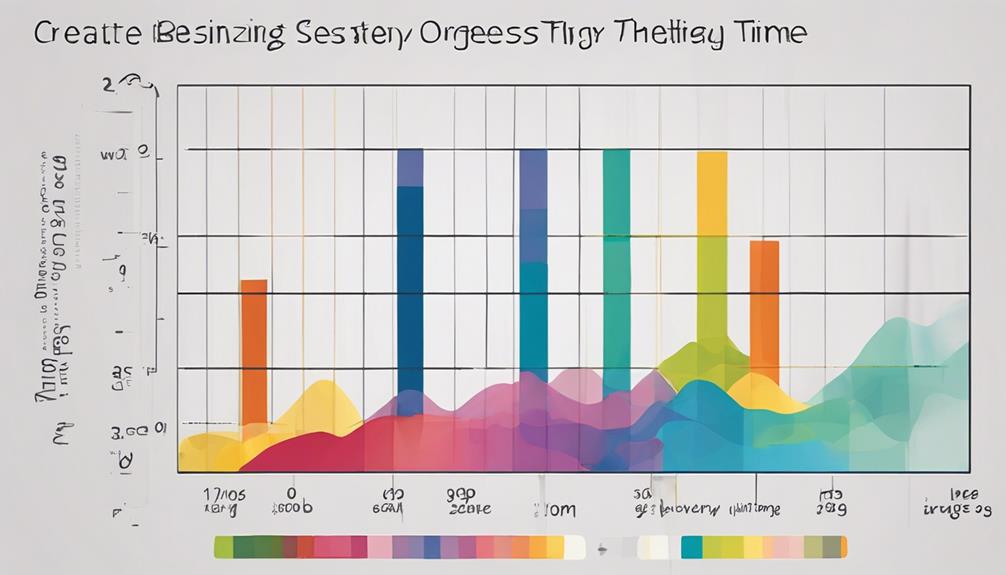Some may question the practicality of implementing dynamic assessment in speech therapy due to its interactive nature and the need for specialized training. However, the effectiveness of this approach lies in its ability to capture the dynamic interplay between a clinician and a client, optimizing intervention strategies to suit individual needs.
By fostering a collaborative and client-centered environment, dynamic assessment not only identifies communication challenges but also paves the way for tailored therapeutic interventions that can lead to significant progress. The key lies in…
Key Takeaways
- Tailoring interventions to individual client needs for personalized effectiveness.
- Real-time observation and feedback enhance tailored interventions and progress tracking.
- Collaboration, engagement, and open communication optimize speech therapy outcomes.
- Addressing communication challenges through tailored strategies and client feedback for effective intervention.
Importance of Individualized Approach
Emphasizing an individualized approach in dynamic assessment allows speech therapists to tailor interventions to the specific needs of each client, optimizing therapeutic outcomes. This personalized strategy in speech therapy plays a crucial role in recognizing the diverse strengths and challenges that each individual presents. By customizing assessment and intervention techniques, therapists can target areas of difficulty effectively while building on existing strengths. This tailored approach ensures that therapy isn't only more efficient but also more engaging for the client, leading to enhanced motivation and progress in communication skills.
The individualized approach in dynamic assessment is fundamental in fostering a collaborative and client-centered therapeutic environment. By acknowledging and addressing the unique learning needs of each individual, therapists can create a more meaningful and impactful intervention plan. This approach not only maximizes the effectiveness of speech therapy but also promotes a sense of empowerment and ownership in the client's journey towards improved communication abilities.
Real-Time Observation of Client Skills

In dynamic assessment, real-time observation of client skills allows speech therapists to directly witness the development of clients' abilities during interactive tasks. This form of assessment provides a unique opportunity to assess clients' responses and adaptations to intervention strategies as they unfold in real-time.
By observing clients in action, therapists gain valuable insights into their learning process and potential for change. Real-time feedback from dynamic assessment serves as a guiding tool for therapists, enabling them to tailor interventions effectively to address clients' specific needs. The immediate observation of client skills not only aids in tracking progress but also plays a crucial role in informing decision-making regarding therapy goals.
Through this hands-on approach to assessment, therapists can better understand their clients' strengths and areas for improvement, leading to more targeted and impactful therapeutic interventions.
Flexibility in Assessment Procedures
With dynamic assessment in speech therapy, the flexibility of modifying assessment procedures based on individual needs and responses allows for a more personalized and tailored approach to evaluating communication abilities and potential for growth. This adaptability in assessment methods ensures that speech-language pathologists can accurately capture the individual's skills and make real-time adjustments to optimize the assessment experience and outcomes. By being flexible in assessment procedures, speech therapists can effectively target specific areas of concern and provide targeted interventions for improvement.
- Adaptability in assessment tasks enhances the accuracy of skill evaluation.
- Real-time adjustments optimize the assessment experience and outcomes.
- Flexibility enables personalized evaluation of communication abilities.
- Targeted interventions can be provided for improvement in language skills.
This personalized and tailored approach to assessment fosters a supportive environment for individuals seeking to enhance their language abilities, ultimately contributing to their overall growth and development in communication.
Collaboration Between Clinician and Client

In collaborative dynamic assessment within speech therapy, active engagement between the clinician and client is pivotal for optimizing the client's learning process and skill development. Collaboration in dynamic assessment involves joint problem-solving and goal-setting to enhance the client's progress. This partnership allows for the identification of strengths, weaknesses, and effective strategies for improvement, creating a supportive and empowering environment for the client's skill development. The clinician and client work together to tailor interventions to the individual's needs, promoting a personalized and impactful approach to therapy. By fostering open communication and mutual respect, collaborative dynamic assessment ensures that the client feels actively involved in their therapy journey, leading to more meaningful outcomes.
| Key Points | Details |
|---|---|
| Active Engagement | Crucial for optimizing the client's learning process |
| Joint Problem-Solving | Enhances progress and goal-setting |
| Identification of Strategies | Strengths, weaknesses, and improvement strategies |
| Supportive Environment | Empowering setting for skill development |
Focus on Learning Potential
As we shift our focus to learning potential in dynamic assessment, we aim to evaluate an individual's capacity for growth and progress.
By examining cognitive skills and the potential for development, we can tailor interventions to maximize effectiveness.
Understanding learning potential provides valuable insights for creating individualized therapy plans.
Learning Capacity Assessment
Assessing learning capacity through Dynamic Assessment in Speech Therapy offers crucial insights into individuals' potential for acquiring new skills and knowledge. This type of assessment focuses on evaluating an individual's ability to learn and develop, providing valuable information for tailored intervention plans.
Here are some emotional points to consider:
- Discovering untapped potential can inspire hope and motivation.
- Uncovering learning strengths can boost confidence and self-esteem.
- Recognizing areas for growth can foster a sense of empowerment and progress.
- Personalizing intervention strategies based on learning potential shows dedication and care.
Understanding learning capacity through assessment is essential for setting achievable goals and maximizing therapeutic outcomes in speech therapy.
Cognitive Skills Evaluation
Evaluating cognitive skills in dynamic assessment provides crucial insights into an individual's learning potential in speech therapy. By focusing on learning potential, dynamic assessment helps therapists understand the individual's capacity for growth and change. This evaluation is essential for tailoring intervention strategies and setting appropriate goals for therapy. Here's an illustrative table highlighting the significance of cognitive skills evaluation in dynamic assessment:
| Importance of Cognitive Skills Evaluation in Dynamic Assessment |
|---|
| Assesses learning potential |
| Tailors intervention strategies |
| Sets appropriate therapy goals |
| Informs about capacity for growth and change |
Understanding an individual's cognitive skills through dynamic assessment is fundamental in optimizing the effectiveness of speech therapy interventions.
Potential for Progress
Exploring the potential for progress in speech therapy involves pinpointing an individual's capacity for growth and adaptability to interventions, crucial for tailoring personalized therapy goals. Understanding learning abilities through Dynamic Assessment is key to unlocking progress.
Here are some emotional cues to consider:
- Hope: Recognizing the potential for progress instills hope for a brighter future.
- Empowerment: Unveiling learning abilities empowers individuals to strive for improvement.
- Resilience: Embracing the journey of progress highlights inner strength and resilience.
- Optimism: Identifying the potential for growth fosters a sense of optimism and positivity in therapy sessions.
Tailored Intervention Planning

In tailoring intervention planning within dynamic assessment, speech-language pathologists customize therapy strategies to address individual responses and needs, enhancing the efficacy and responsiveness of speech therapy. By creating specific goals and objectives tailored to each client, speech therapists ensure that interventions are personalized and adaptive to the individual's performance. This personalized approach fosters a more effective and responsive therapy experience, leading to improved outcomes and progress for the client.
—
| Benefits of Tailored Intervention Planning |
|---|
| Personalized Goals |
| Adaptive Strategies |
| Enhanced Effectiveness |
—
This tailored intervention planning process allows therapists to make informed decisions and adjustments based on the client's progress, maximizing the potential for improvement. By customizing interventions to suit the unique needs of each individual, speech-language pathologists can optimize therapy outcomes and provide targeted support for enhanced learning and development.
Enhancing Client Engagement

To further optimize the therapeutic process, we'll now shift our focus towards enhancing client engagement within dynamic assessment, fostering active participation and collaboration for more meaningful outcomes in speech therapy.
Client engagement in dynamic assessment is crucial for promoting active participation and collaboration in the learning process. Tailoring tasks to the client's interests and strengths not only enhances motivation but also increases their investment in therapy.
Using engaging materials and interactive activities is key to fostering a positive and productive therapeutic relationship. Moreover, incorporating the client's preferences and feedback is essential as it boosts their sense of ownership and empowerment in the therapy process.
Building rapport and trust through engaging interactions creates a supportive environment for effective communication and skill development. By prioritizing client engagement, speech therapists can create a more enriching and effective therapy experience that caters to the unique needs and preferences of each individual.
Addressing Communication Challenges

In addressing communication challenges, we pinpoint specific skills and craft individualized intervention plans to nurture progress effectively.
By tailoring strategies to each individual's learning potential, we can create targeted approaches that support growth in communication skills.
This personalized method allows us to identify areas for improvement and adapt our techniques to meet the unique needs of clients.
Targeting Specific Skills
By targeting specific skills through dynamic assessment in speech therapy, tailored interventions can effectively address communication challenges. Dynamic assessment allows us to delve deep into individual skill deficits, paving the way for personalized therapy goals.
This focused approach enables us to create interventions that are precisely tailored to each client's needs, maximizing the effectiveness of the treatment. By honing in on specific areas of difficulty, we can deliver targeted support that's designed to yield significant improvements in communication abilities.
Through this method, speech therapists can truly make a difference in the lives of those facing communication challenges.
- Identifying individual skill deficits
- Creating personalized therapy goals
- Delivering targeted support
- Maximizing treatment effectiveness
Individualized Intervention Plans
Targeting specific communication challenges through individualized intervention plans is a key aspect of dynamic assessment in speech therapy. By tailoring interventions to each individual's learning potential, speech-language pathologists (SLPs) can create effective strategies to address communication difficulties.
These personalized plans focus on identifying areas for growth and adaptability in communication skills, allowing for targeted support based on the individual's responses and progress during the assessment. Through dynamic assessment, SLPs can differentiate between speech-language differences and disorders, guiding the development of customized intervention approaches.
This individualized approach ensures that therapy is tailored to the unique needs of each client, maximizing the effectiveness of interventions and promoting meaningful progress in communication abilities.
Monitoring Progress Over Time

Through tracking changes in skills and abilities across multiple sessions, speech therapists can effectively monitor progress over time in dynamic assessment. This ongoing evaluation is crucial for understanding the client's development and the effectiveness of the therapy provided. Here are some emotional considerations to highlight the significance of monitoring progress:
- Witnessing gradual improvements can be incredibly rewarding for both the client and the therapist, fostering motivation and a sense of achievement.
- Identifying obstacles and setbacks allows for timely adjustments in the intervention plan, ensuring that the client receives the support they need.
- Celebrating milestones reached during the therapy journey can boost confidence and encourage continued progress.
- Reflecting on the journey from the initial assessment to the current stage can evoke feelings of pride and satisfaction, showcasing the transformative power of speech therapy.
Monitoring progress over time not only serves as a tool for assessing outcomes but also as a source of inspiration and encouragement for all involved in the therapeutic process.
Culturally Responsive Assessment Practices

In our exploration of culturally responsive assessment practices,
we highlight the significance of cultural sensitivity and understanding diverse communication patterns.
By acknowledging the importance of cultural context,
speech therapists can tailor assessments to better serve clients from various cultural backgrounds.
This approach ensures that assessment procedures are respectful, accurate,
and effective in supporting clients' unique linguistic and cultural needs.
Cultural Sensitivity Importance
Considering the unique cultural and linguistic identities of individuals being assessed, culturally sensitive dynamic assessment practices play a crucial role in providing a more accurate and comprehensive evaluation in speech therapy.
- Embracing diversity fosters trust and collaboration.
- Respecting cultural differences enhances rapport and engagement.
- Acknowledging individual backgrounds promotes a sense of belonging and understanding.
- Tailoring interventions to cultural needs ensures effectiveness and relevance.
Diverse Communication Understanding
Culturally responsive assessment practices in dynamic assessment prioritize understanding diverse communication for a more inclusive and tailored evaluation approach. By considering the unique cultural and linguistic identities of individuals, these practices offer a holistic alternative to standardized testing methods. Incorporating diverse communication understanding into dynamic assessment components informs clinical decision-making for better-tailored interventions. Understanding clients' cultural backgrounds enhances assessment accuracy, supporting effective therapy planning. Culturally responsive dynamic assessment promotes equity in speech therapy by addressing individual needs and ensuring culturally sensitive interventions.
| Culturally Responsive Assessment Practices | Benefits |
|---|---|
| Considers unique cultural identities | Holistic evaluation approach |
| Informs clinical decision-making | Tailored interventions |
| Enhances assessment accuracy | Effective therapy planning |
| Promotes equity in speech therapy | Culturally sensitive interventions |
Application Across Age Groups

Across age groups, dynamic assessment in speech therapy demonstrates its effectiveness in tailoring intervention plans to address individual communication needs. This approach is versatile and beneficial in catering to the diverse requirements of clients at different life stages. Here are some key points to consider:
- Personalized Interventions: Dynamic assessment allows for personalized intervention strategies that are specifically designed to meet the unique needs of children, adolescents, adults, and seniors.
- Developmental Considerations: Tailoring interventions based on developmental milestones helps address language issues in children while focusing on maintaining and improving communication skills in older individuals.
- Adaptability: The adaptability of dynamic assessment enables speech therapists to assess and intervene in language and communication challenges across a wide range of age groups.
- Client-Centered Approach: By considering the age-related communication needs of clients, dynamic assessment ensures that therapy plans are relevant and impactful for individuals of all ages.
Integration of Client's Feedback

Client feedback integration in dynamic assessment enhances the customization and effectiveness of intervention strategies tailored to individual communication needs. By actively involving clients in the assessment process, speech therapists gain crucial insights into the client's preferences, challenges, and progress. This collaborative approach allows for the development of individualized intervention plans that cater specifically to the client's unique requirements. Client feedback not only aids in adjusting the pace and content of therapy but also plays a significant role in maintaining the client's engagement and motivation throughout the treatment process.
Moreover, incorporating client feedback fosters a client-centered approach to speech therapy, where the client's input is valued and prioritized. This shift towards a more collaborative dynamic not only empowers the client but also leads to more successful outcomes in therapy. By utilizing client feedback effectively, speech therapists can ensure that interventions aren't only evidence-based but also tailored to the individual needs and preferences of each client.
Impact on Treatment Efficacy

Dynamic Assessment in speech therapy significantly enhances treatment efficacy by providing real-time insights into a client's response to tailored interventions, guiding targeted therapy approaches through interactive tasks and immediate adjustments to treatment plans. This method can help optimize the therapy process in the following ways:
- Personalized Approach: Dynamic Assessment allows for tailored interventions based on individual learning potential and adaptability, leading to more effective treatment outcomes.
- Interactive Feedback: By offering real-time insights into a client's response to teaching strategies, Dynamic Assessment enhances the efficacy of therapy sessions.
- Targeted Therapy: Focusing on interactive and process-oriented tasks, Dynamic Assessment guides therapy approaches towards specific goals and desired outcomes.
- Immediate Adjustments: The test-teach-retest model in Dynamic Assessment enables therapists to make prompt adjustments to treatment plans, ensuring that interventions are constantly optimized for the client's benefit.
Through the implementation of a Mediated Learning Experience, Dynamic Assessment supports therapists in effective intervention planning and goal setting, ultimately improving treatment efficacy and client outcomes.
Frequently Asked Questions
What Are the Benefits of Dynamic Assessment Slp?
The benefits of Dynamic Assessment in speech therapy, as Speech-Language Pathologists, include:
- Accurately diagnosing language differences and disorders,
- Tailoring interventions based on individual needs,
- Yielding valuable insights into intervention responses.
It supports clinical decision-making, goal planning, and effective therapy strategies. Evaluating stimulability for skill improvement and differentiating language issues are crucial when working with culturally diverse clients.
Dynamic Assessment helps us provide targeted and personalized therapy to maximize clients' learning potential.
In Which Circumstances Dynamic Assessment Is Most Beneficial?
In various circumstances, dynamic assessment proves highly advantageous. It excels in evaluating challenging cases, such as bilingual, culturally diverse, or special needs individuals. By focusing on learning potential rather than just current abilities, this approach allows us to tailor intervention strategies effectively.
Its emphasis on adaptability and readiness for change helps predict individual responsiveness to intervention, making it a valuable tool for diverse populations in speech therapy.
What Is One of the Advantages to Using Dynamic Assessment DA Measures?
One advantage of using dynamic assessment measures is the ability to gain real-time insights into an individual's responsiveness to teaching strategies.
This information allows us to tailor therapy approaches more effectively, leading to targeted interventions that address specific needs.
What Is the Strategy Used in Dynamic Assessment?
In dynamic assessment, the strategy employed is the test-teach-retest model grounded in Vygotsky's Zone of Proximal Development (ZPD). This approach involves guiding individuals through a learning task, providing support as needed, and evaluating their progress.
Conclusion
In conclusion, dynamic assessment in speech therapy is a powerful tool that allows speech therapists to tailor interventions to individual needs, observe real-time skills, and collaborate with clients effectively. By focusing on learning potential and adaptability, this approach enhances treatment efficacy and provides valuable insights for diverse clients.
The impact of dynamic assessment is far-reaching, influencing positive outcomes across age groups and cultural backgrounds. The suspense of its potential outcomes leaves us eager to witness the transformative effects it can have on speech therapy practices.









